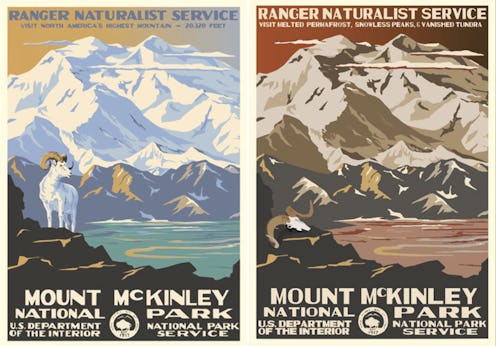News
This Artist Shows What Climate Change Could Do To National Parks
When President Trump donated his presidential paycheck of more than $78,000 to the National Park Service earlier this month, the act of generosity seemed more symbolic than charitable. That's because Trump's proposed policies seem to threaten the park service and the environment it protects. Now, a new art series from Hannah Rothstein shows what national parks could look like if the federal government's inaction persists.
With National Parks 2050, Rothstein redesigned iconic national parks posters to reflect the impacts of climate change over time. The original posters date back to the 1930s and 1940s, but Rothstein envisioned what their scenes would actually look like in 2050. The result is a series of colorful, retro-looking posters that show thinning trees, receding waters, and starving bears. In a poster promoting California's redwoods, for instance, Rothstein depicts a hazy, yellow sky above a disappointing forest of dismembered tree trunks.
"I'd for a long time been noodling on how I could use my art to address the topic of climate change, an issue that worries me immensely," Rothstein tells Bustle. "When [a client] referenced the National Parks, I had my lightbulb moment."
According to her website, Rothstein sees the series as "a call to action" that makes climate change "hard to ignore."
Although Rothstein does not mention the president or his administration by name — in fact, she says she's purposefully keeping politics out of it — it is clear that the federal government needs a climate change message that's "hard to ignore." It has been about two weeks since Trump donated his paycheck to the National Parks Service, but it has been just over a month since Trump submitted his first federal government budget proposal.
That proposal made headlines for its suggested cuts to programs like Meals on Wheels, but it also proposed cuts that could impact the National Parks Service. According to the budget document, Trump proposed reducing the Department of the Interior's budget by 12 percent, or $1.5 billion. Meanwhile, national parks, which are part of the Interior Department, already struggle to keep up with their maintenance.
"I'm making a concerted effort to keep politics out of this work, as climate change needs to be recognized as a non-partisan issue," Rothstein says. "We have the ability to put the brakes on climate change, but we need to devote our collective resources to it now. I'm hoping this work will inspire our country's policymakers to put politics aside, focus on the greater good, and ensure a safe, bountiful future for their children and grandchildren."
Rothstein says she is selling prints and paintings and donating a portion of the proceeds to climate-focused organizations. You can follow her on Instagram at @HRothsteinArt or on Facebook. She says she chose parks that were in geographically and politically diverse states to really hit home on the fact that climate change will affect everyone, even if they don't believe in climate change.
"If everyone acknowledged climate change was an issue, I wouldn't have needed to make this work," Rothstein tells Bustle. "This work's very existence speaks to the fact that we're not all acknowledging the reality and gravity of climate change. I'm hoping this work helps us move past that, so we can get started on solutions."
It's not just national parks that face challenges under the Trump administration — it's everyone. Last month, Trump announced plans to dismantle President Obama's Clean Power Plan, which put forth strategies for reducing air pollution from power plants. If unhealthy air pollution and climate change as a whole remain uncurbed, then Rothstein's posters might soon represent reality.
Additional reporting by Celia Darrough.
